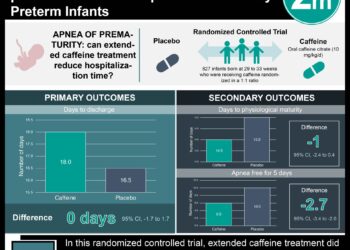Increased seizures during rewarming of neonates associated with risk of abnormal neurodevelopmental outcomes at 2-year follow-up
1. Increased frequency of electrographic seizures during rewarming in neonates was associated with a higher risk of abnormal neurodevelopmental outcomes at age 18 to 22 months.
2. In addition to the standard 72-hour duration of hypothermia, it is recommended that monitoring be continued throughout rewarming until normothermia and seizure control has been achieved in the neonate.
Evidence Rating Level: 2 (Good)
Study Rundown: Hypothermia has been shown to improve long-term outcomes in neonatal hypoxic ischemic encephalopathy compared to normothermia. Despite this, there is room for optimization of care, as 29% of infants continue to have abnormal outcomes at age 18 to 22 months, where data on the risk of seizures during the rewarming phase is limited. This nested cohort study (SMART) assessed the likelihood of electrographic seizures during rewarming at 72 or 120 hours and their association with neurodevelopmental outcomes at 2 years, where it was hypothesized that seizures during rewarming were associated with higher odds of abnormal neurodevelopmental outcomes. The main endpoint was the occurrence of electrographic seizures during rewarming initiated at 72 or 120 hours compared with the preceding 12-hour epoch. Secondary endpoints included death or moderate or severe disability at age 18 to 22 months. Among 120 newborns, higher occurrence of electrographic seizure during the rewarming phase after hypothermia was associated with elevated relative risk of death or disability at 2-year follow-up. This association between seizure occurrence during rewarming and poor neurodevelopmental outcomes supported the American Clinical Neurophysiology Society’s Guidelines of continuous electroencephalography monitoring in neonates with suspected perinatal asphyxia at high risk. In addition to the standard 72-hour duration of hypothermia, it is recommended that monitoring be continued throughout rewarming until normothermia and seizure control has been achieved. A limitation of this study was the lack of hemodynamic evaluation to confirm the underlying mechanisms of electrographic seizures and rule out confounding causes of seizure in neonates.
Click to read the study in JAMA Neurology
Relevant Reading: Rebound seizures during rewarming
In-Depth [prospective cohort]: This nested multicenter cohort study included a total of 120 newborns (70 male [58%]; mean [SD] gestational age, 39 [1] weeks) from the Eunice Kennedy Shriver National Institute of Child Health and Human Development (NICHD) Neonatal Research Network trial between December 2011 to December 2013, with data analysis completed in January 2020. Two-year follow-up was randomized to either 72 hours of cooling (group A, n = 66) or 120 hours (group B, n = 54). For interventions, serial amplitude electroencephalography recordings were compared 12 hours prior and during rewarming for evidence of electrographic seizure activity by 2 central amplitude-integrated electroencephalography readers blinded to treatment arm and rewarming epoch, with excellent interrater agreement (κ, 0.99). Overall, more infants had electrographic seizures during the rewarming epoch compared with the preceding epoch (group A, 27% vs 14%; P = .001; group B, 21% vs 10%; P = .03). Adjusted odd ratios (95%CIs) for frequency of seizures during rewarming were 2.7 (1.0-7.5) for group A and 3.2 (0.9-11.6) for group B. After adjusting for baseline clinical encephalopathy and seizures, infants with electrographic seizures during rewarming had significantly higher risks of secondary outcomes of death or moderate to severe disability at 2 years (relative risk [95%CI], 1.7 [1.25-2.37]).
Image: PD
©2021 2 Minute Medicine, Inc. All rights reserved. No works may be reproduced without expressed written consent from 2 Minute Medicine, Inc. Inquire about licensing here. No article should be construed as medical advice and is not intended as such by the authors or by 2 Minute Medicine, Inc.









